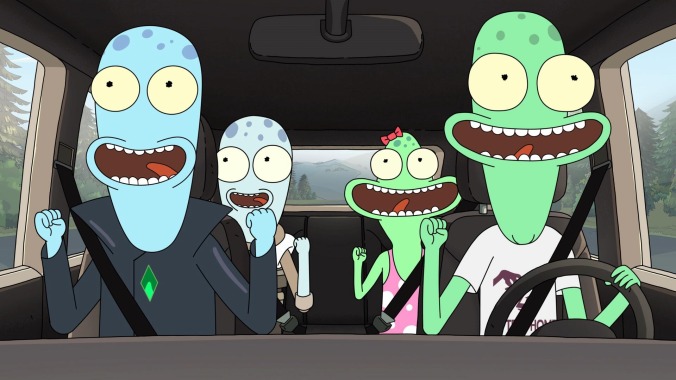A bleak comic misanthropy runs through the sunny veneer of Solar Opposites season 2


The first season of Solar Opposites, Hulu’s animated sci-fi comedy, played like a good-natured subversion of sitcom tropes. Despite the often outlandish premises and occasionally gruesome results of the misadventures of a quartet of aliens stranded on earth, the series delivered plenty of humor, served up with antic pacing and an easygoing disregard for the rigid structures of traditional TV narrative (which the show celebrated as much as it lampooned). There was genuine affection between the characters, making for a nicely humanistic grounding to what otherwise could have just been madcap weirdness for its own sake. Or, as someone says in one of the many meta moments of the new season, “I just learned that sometimes emotional stories don’t fit into rigid structures and you just have to learn to embrace the chaos and not worry about it.” This is a series that seemed to be talking to itself—in an empathetic way—as much as it talked to the audience. And while that tone at first appears unchanged in season two, some wellsprings of a bleaker worldview are starting to bubble up from beneath the surface.
The setup is fundamentally the same as in season one—so much so, the first episode offers a playful wink to the everything-the-same history of sitcom structure by crashing the alien ship all over again. (“This puts us right back to where we were a year ago!”) Four aliens—fussy scientist Korvo (Justin Roiland), slacker Terry (Thomas Middleditch), moody teen Yumyulack (Sean Giambrone), and bubbly Jesse (Mary Mack)—are trapped on Earth following the destruction of their home planet, caring for a puppy-sized pupa meant to one day terraform the planet, extinguishing all life in the process. And while the new season mostly conforms to that same premise and collection of fish-out-of-water character dynamics, there are some mild differences in the early episodes to suggest our protagonists are starting to adjust to their new lives, settling into rhythms and roles geared toward making life on Earth more tolerable. Korvo and Terry, in particular, have more of a married couple vibe than the previous My Two Dads setup, even resolving one conflict by sharing an affectionate kiss. And Yumyulack and Jesse, while still squabbling siblings, have begun to adopt a more laissez-faire approach to dealing with each other’s impulsive choices.
And for a while, that sweetness endures. The first half of the season maintains the show’s signature blend of outrageous, often gruesomely violent, scenarios with a fast-paced blitzkrieg of jokes and sunny, even downright earnest sentiment. There’s a more-is-more tendency toward turning up the dial on all those elements; some of the installments, like a story where Yumyulack tries to harness the power of BDE (yes, “Big Dick Energy”) only for his new genitals to outstrip his control and start melting any humans within radius of influence, is practically South Park-ian in its raunch and acidic cultural observations. And when the group uses an “Emergency Urbanizer” ray to transform a wooded area into an all-organic-matter recreation of a fully functioning city, each member of the team gets lost in their own selfish pursuits for a time (Yumyulack: “I’m gonna work in finance, because I always wanted to be a shithead”), but by episode’s end, they’ve once more come together as a family.
But in the back half of the season, Solar Opposites starts to reveal a slightly darker view of both the world and its characters. One episode sees the return of the formerly homicidal Red Goobler (Roiland)—now engaged and seeking forgiveness for his previous attempts to murder Korvo—which spirals into Korvo and Terry sneeringly heaping disdain and violence upon the wedding party. The occasional insults lobbed toward neighbors, which previously masked the group’s insecurity over the relatable desire to be liked by others, seems to have curdled into actual vitriol: An episode that sees them sent to jail for an act of surprisingly dark torture ends by offering our protagonists a reprieve, but not before all four of them demonstrate an inability to feel remorse for more than a few seconds before making a random person cry. It’s weirdly mean-spirited. And without giving anything away, the season ends on a celebration of cruelty, making these characters all come across as far less likable than before.
Thankfully, the show’s rapid-fire approach to humor helps to leaven this more misanthropic tone. Terry is still a pop-culture obsessed goofball, teasing Korvo constantly while relying on him for nearly everything, including affection. And the series is even more meta than before, with characters calling out the plots of episodes in order to evaluate them positively or negatively—not to mention referring to themselves as the series title. (Almost every episode contains at least one instance of Terry exclaiming, “The Solar Opposites are going to [blank]!”) The laughs don’t come as swiftly as they did in the first season, but there’s a dependably solid hit-to-miss ratio with the humor.
The series’ most inventive element—the ongoing show-within-a-show drama that takes place in the miniaturized reality of Yumyulack’s Wall—is back for another round of straight-faced genre thrills. Whereas last year’s penultimate episode was a surprise change of pace (swapping out a zany animated comedy for a send-up of Hollywood action played deadly serious) this time around, the expectation of more Wall stories pays off quickly, with a serialized subplot that unfolds over the course of the first six episodes—an entire B-movie plays out in short excerpts before we even get to the inevitable all-Wall installment. And while it’s again treated utterly stone-faced in execution, the show allows some comedy to trickle in here and there. (“Fuck! My tiny leg is broken!” exclaims one of Yumyulack’s shrunken victims.) Solar Opposites’ second season is a heaping helping of everything from the first season, but spread even thicker; whether or not the increasingly snide perspective its characters share will get even harsher in season three is a question even the denizens of the Wall can’t foresee.